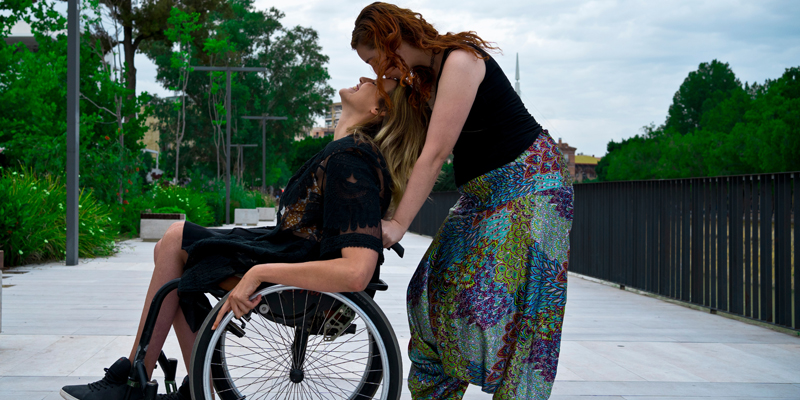Stroke causes negative experiences of sexuality for LGBTQI+ stroke survivors and partners, study finds

A first known study exploring post stroke sexuality has found that stroke resulted in changes in relationships, intimacy, and sexuality in LGBTQI+ stroke survivors and LGBTQI+ stroke survivors’ partners. The main areas affected included sexual functioning, relationships, and identity.
"I didn't feel I had any opportunity to experience sexual relations with anybody."
"The gay community attitude to disability and difference is really quite distressing. It’s body image and body beautiful."
"Our sex life just basically died."
"I don't get invited to parties, but I just felt like they overlooked me for stuff like that."
The findings from this qualitative study, led by William Kokay, a PhD student at the Faculty of Medicine and Health at University of Sydney, illustrate the challenges and limitations that LGBTQI+ stroke survivors and their partners face due to experiences of changes in sexuality post-stroke.
Published in the Journal of Disability and Rehabilitation, the study highlights experiences of discrimination that participants experienced post-stroke within the LGBTQI+ community. For participants in this study, the LGBTQI+ community was a form of safety and inclusiveness prior to experiencing their stroke, however this was no longer the case post-stroke. This experience speaks to the challenge of intersecting forms of discrimination or the challenge of holding multiple minoritized identities.
Supervised by Professor Margaret McGrath from the School of Clinical Therapies at University College Cork (UCC), Professor Emma Power from University of Technology Sydney and Associate Professor Roxanna Pebdani from University of Sydney, the study also explored how LGBTQI+ persons navigate changes in sexuality post-stroke, including the use of adaptation strategies and alternative sexual activities in an attempt to ensure that opportunities to express their sexuality were still maintained. Additionally, partners of LGBTQI+ stroke survivors were found to experience a change in their role of partner to carer and how this negatively affected their own personal needs.
Professor Margaret McGrath said: “Clinical guidelines for stroke care recommend that all stroke survivors and their partners have the opportunity to receive information and ask questions about sexuality following stroke. Our earlier research demonstrates that less than 20% of stroke survivors ever have this opportunity despite over 70% of stroke survivors experiencing concerns related to sexuality.”
“We also know that LGBTQI+ stroke survivors are likely to face even more barriers to accessing suitable information – because most of the limited resources which currently exist are focused on heterosexual persons and because health professionals often report high levels of discomfort discussing or responding to sexual concerns among LGTQI+ persons. This study addresses that gap and offers new information which can guide the development of resources to support the LGBTQI+ community,” she added.
A qualitative phenomenological research design was used to gather and analyse data from participants. A total of 23 participants were recruited for the study: 18 stroke survivors, 5 partners (1 participant who was both a stroke survivor and partner of a stroke survivor). In addition to 12 gay men, the study recruited 5 lesbian women, 4 queer persons (3 women, 1 of whom was transgender and 1 man, 1 bisexual non-binary person and 1 pansexual transgender man. Participants were aged between 28 and 74 years of age.
Four main themes were established from the data analysis to address how stroke impacted sexuality among LGBTQI+ stroke survivors and partners of LGBTQI+ stroke survivors. These major themes were:
- It impacted my sex life
- Everything was affected because of stroke
- It has definitely had a bigger impact on relationships
- I want to engage with the (LGBTQI+) community.
Participants identified that they experienced negative changes in relation to their sexual activity, sexual behaviours, and non-intimate relations post stroke. Many participants identified physical impairments such as hemiplegia or post-stroke fatigue. These issues contributed to sexual dysfunction due to decreased mobility or ability to initiate sexual activity due to fatigue.
The study offers new information which can guide the development of resources to support the GBTQI+ community. The experiences reported by participants within this study can assist with the development of knowledge into the impacts of stroke on sexuality in LGBTQI+ stroke survivors and LGBTQI+ stroke survivors’ partners. This will assist health professionals to provide specific support and intervention that addresses the needs of LGBTQI+ stroke survivors and their partners.
UCC Research
Aistriú Taighde
Contact us
Office of Vice President for Research & Innovation, 4th Floor, Block E, Food Science Building University College Cork, T12 K8AF
